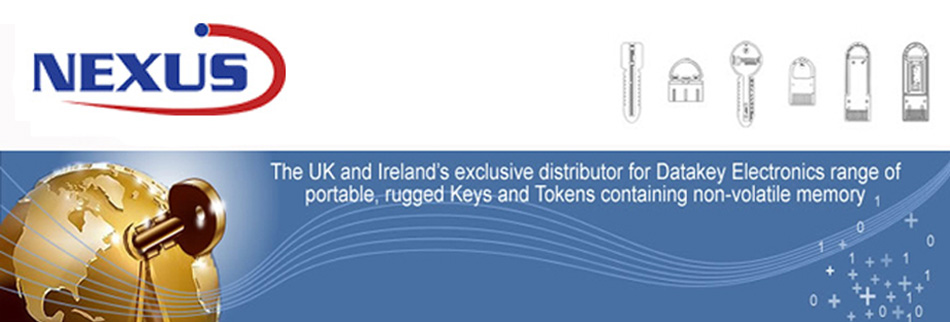 ~ Nexus GB releases new PC based development tools to help design engineers stuck at the drawing board ~
~ Nexus GB releases new PC based development tools to help design engineers stuck at the drawing board ~Nexus (GB), the UK partner of portable data token manufacturer Datakey Electronics, has released a family of serial development kits that provide all the necessary tools to build a simulated portable data system and test its features and benefits. The basic development kit covers the majority of Nexus’ range, whilst a specialist kit covers its NFX managed memory tokens, which act as USB style portable data carrier devices without the drawbacks of a consumer style memory product.
The kit allows Visual C++ or Visual Basic programmers to easily learn to integrate memory keys or tokens, greatly reducing research and development time and costs.
The NFX version of the development kit supports the latest release of the NFX family of tokens and includes a sample application, which illustrates how to use each of the example commands. Also new is a command line utility that allows for simplified testing and configuration of the NFX token’s unique OEM and security features.
Both kits operate with any Windows 98, ME, NT, 2000 or XP PC and guide the user through a simple programming process for a variety of basic commands. Each development kit includes a panel mount and a board mount or receptacle, a key or token memory device, an RS-232 or USB connecting cable, PC demo software, sample source code, and a programmer’s reference manual. The NFX version of the development kit contains two tokens and two receptacles.
"The NFX Managed-Memory line of portable memory tokens was designed with OEMs in mind," says Michael Barrett, Nexus’ operations director. "Long-term availability, stable command set, USB or SPI interfaces, ultra-rugged and reliable operation, special OEM and security features, custom logo options —these are all qualities that OEMs require in a portable data carrier."
Both development kits provide documentation on how to develop applications for embedded and PC platforms. Because the NFX has both SPI and USB options, it can interface with an embedded microprocessor through its SPI bus and/or with a PC or embedded computer through its USB bus. This provides an effective form of data transport in applications or environments where networking is impractical or impossible.
Ends: 379 words
Editor’s note: If you want to stay constantly up to date on the latest news from Nexus GB, paste the following link into your RSS reader http://nexus-pr.blogspot.com/atom.xml.
For further information contact:
Michael Barrett, Operations director, Nexus GB,
Rushdene House, Dodsley Grove, Midhurst, West Sussex, GU29 9BE
Telephone: +44 (0)1730 816502
Fax: +44 (0)1730 817393
www: http://www.nexusgb.co.uk/
e-mail: michael@nexusgb.co.uk
Press enquiries: Richard Stone
Stone Junction, 33 Kirkdale,
Sydenham, London, SE26 4BT
Telephone: +44 (0) 20 8699 7743
Fax: +44 (0) 20 8699 7743
e-mail: richards@stonejunction.co.uk
www: http://www.stonejunction.co.uk/
Blog: http://www.stone-junction.blogspot.com/
About Nexus GB: Established in 1986 Nexus GB is Datakey Electronics’ UK and Ireland exclusive distributor for portable, rugged keys and tokens containing non-volatile memory. These reliable and re-programmable items provide data transport, security, and access control solutions even in extreme environments where other methods, such as USB memory, would not survive. Furthermore, distinct from consumer-like memory solutions, they are a well established product that will not become obsolete as technology progresses. As a result, they are commonly used by design engineers working on long term projects, with more than three million units currently in UK service.
Ref: NEX034/06/09
About Nexus GB: Established in 1986 Nexus GB is Datakey Electronics’ UK and Ireland exclusive distributor for portable, rugged keys and tokens containing non-volatile memory. These reliable and re-programmable items provide data transport, security, and access control solutions even in extreme environments where other methods, such as USB memory, would not survive. Furthermore, distinct from consumer-like memory solutions, they are a well established product that will not become obsolete as technology progresses. As a result, they are commonly used by design engineers working on long term projects, with more than three million units currently in UK service.
Ref: NEX034/06/09

